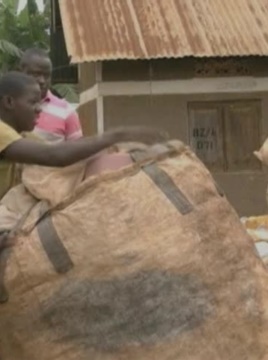VOA常速英語:烏干達和哥倫比亞將塑料垃圾變廢為寶
Zlatica Hoke
November 11,2014
WASHINGTON— People around the world use disposable plastic containers for water, food and other content because of their practicality and light weight. But if not discarded properly, these plastics can litter populated areas, pollute water systems and create environmental damage. Plastic waste is a real problem in many poor countries. An African and a South American country have turned the menace into an advantage.
 |
The water drainage system in Uganda's capital, Kampala, is providing a livelihood for hundreds of people who collect carelessly thrown away trash.
David Kibande manages about 10 workers who collect up to 10 tons of plastic waste a week, and sell it for the equivalent of about seven U.S. cents per kilogram. Kibande said the people he supervises would otherwise be jobless. Now, they make a living while helping to clean up the city.
More than half of the trash in Uganda's capital is left uncollected by understaffed and underfunded municipal services. Much of it ends up in drainage channels, natural water courses, streets and undeveloped plots. Environment authorities say that about 600 tons of plastic are discarded in Kampala every day.
Private companies, such as the Plastic Recycling Institute (PRI), run by South African beverage company SABMiller, have stepped in to help reduce the waste by employing people to collect plastic waste for recycling. The Kampala plant recycles 650 kilograms of plastic per hour and more than 3 million kilograms annually, which means that much less ends up in Uganda's environment.
"I would say it's working. If… there were no recycling plants that means all the plastics we are collecting right now would be in the rivers and streets,” said Jean-Baptiste Bitamazire, a PRI plant manager.
The plastics are sorted, washed and processed for the manufacturing of other plastic products, including floor tiles and roof slates.
A continent away, a private initiative called "Organizmo" is teaching students how to mix plastic bottles with sand, clay and straw to build sustainable homes in central Colombia.
"If we can understand how we discard and consume and incorporate that into the cycles that surround us, that can lead to certain practices of recycling, reuse, of knowledge of the land," said Ana Maria Gutierrez, director and founder of Organizmo.
Students from Colombia and other countries learn how to use waste and natural material to build "green" farm houses, which include rain water treatment systems and composting toilets.
Lucia Cano, an architect from Spain, said she came to learn how to include care of the environment in her profession.
"Forty percent of carbon emissions come from construction, of construction all over the world. So if we architects want to build, we must consider potential harm to our generations, and that we could destroy Mother Nature," said Cano.
Environmentalists often point out that conserving Nature and its resources need not be expensive. Mostly, it just takes initiative and persistence to develop good habits.
- 頻道推薦
- |
- 全站推薦
- 推薦下載
- 網(wǎng)站推薦




















